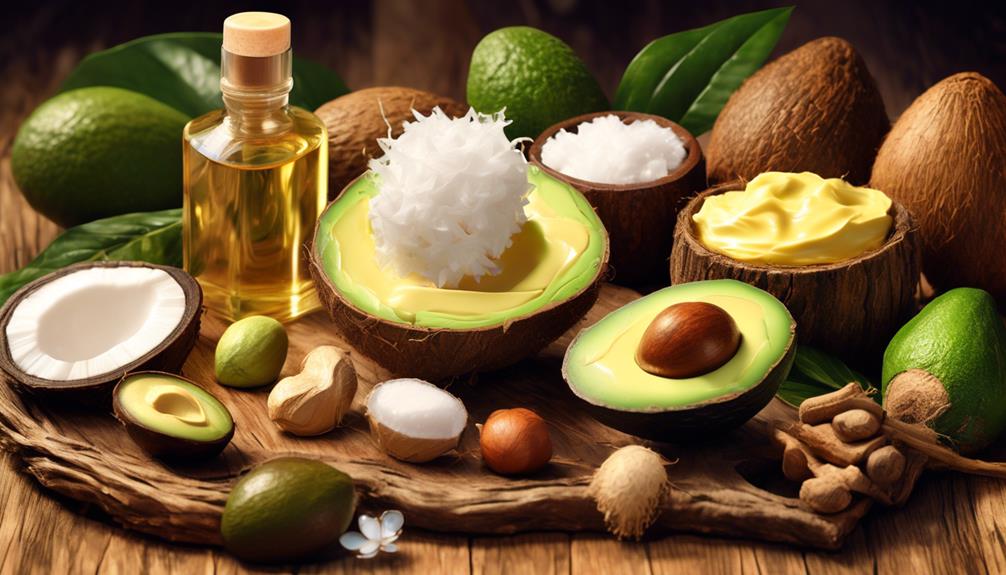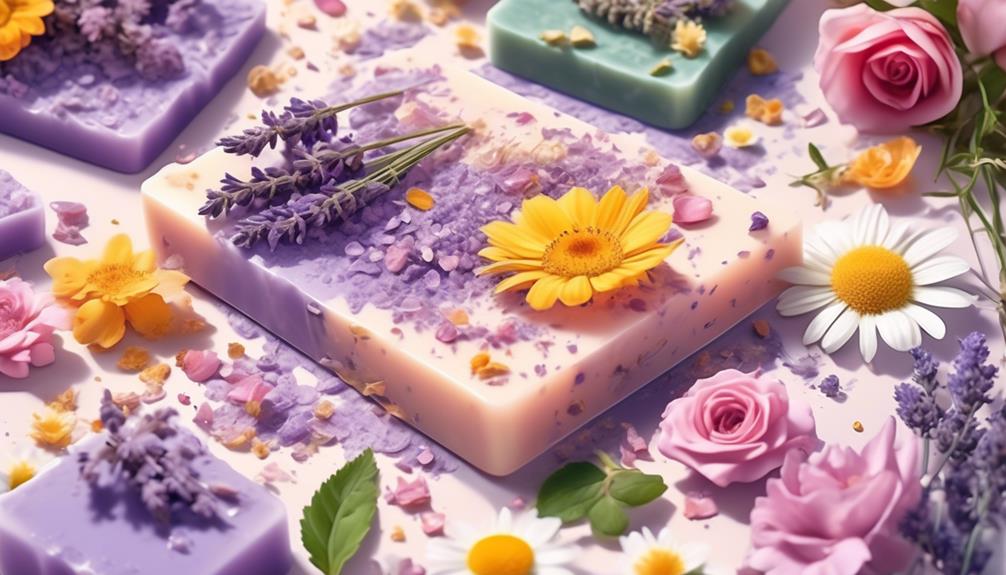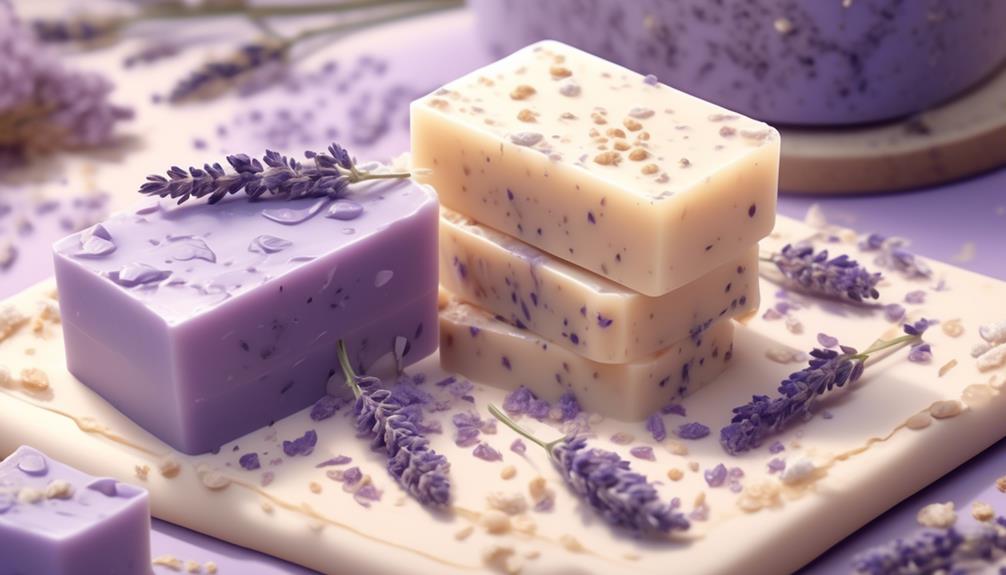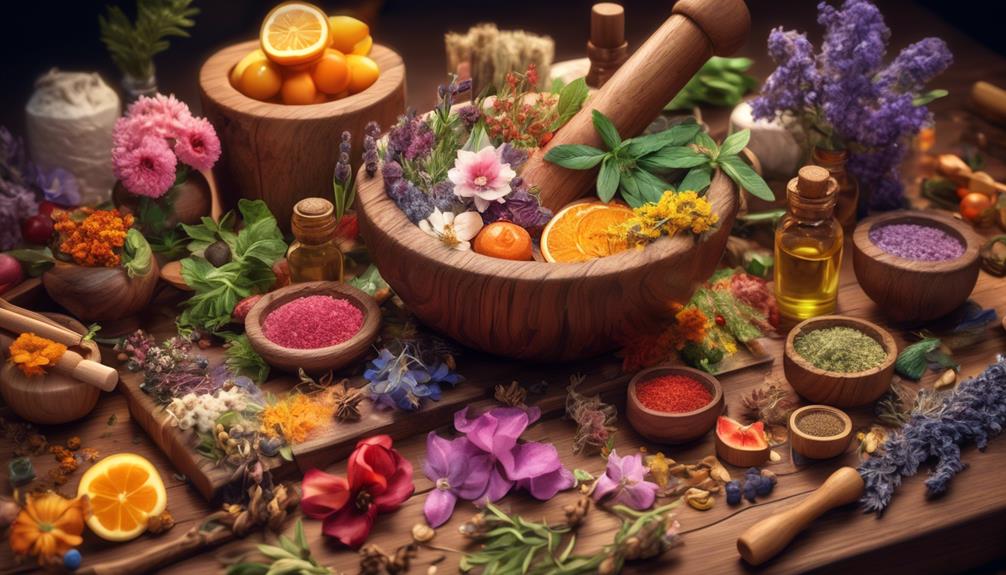As you stand in front of the soap-making aisle at the store, a wide array of options overwhelms you. You want a soap that not only cleanses your skin but also provides a luxurious and natural experience. That’s where natural soap additives come in.
From nourishing oils to aromatic herbs and exfoliants, these additives can elevate your soap-making game and create a personalized product that caters to your specific needs.
In this guide, we will explore different types of natural soap additives, their benefits, and how you can incorporate them into your homemade soaps. Get ready to discover a world of possibilities that will leave your skin feeling refreshed and rejuvenated.
Types of Natural Soap Additives
- Natural oils and butters such as olive oil, coconut oil, shea butter, and cocoa butter have various benefits for soap, including moisturizing, cleansing, and soothing properties.
- Aromatic herbs like lavender, rosemary, peppermint, and chamomile can be used in soap for their relaxing, invigorating, cooling, and soothing effects.
- Essential oils are concentrated plant chemicals that can add scent to soap, and they should be used in the correct proportion for safety and can provide additional benefits.
- Natural colorants like clays, botanicals, fruit purees, and cocoa powder can add vibrant colors to soap while also providing skin benefits, and experimenting with them allows for unique and visually appealing creations.
Types of Natural Oils and Butters for Soap

When making soap, it’s essential to carefully select the types of natural oils and butters that will provide nourishing properties to your final product. Natural soap additives play a crucial role in creating a soap that not only cleanses but also nourishes and moisturizes the skin.
There are several types of natural oils and butters commonly used in soap making.
Olive oil, a beloved option among many, is widely renowned for its gentle nature and its remarkable capacity to produce a luxuriously smooth and frothy lather when incorporated into soap. This exquisite ingredient boasts an abundance of antioxidants and nourishing vitamins, rendering it highly advantageous for the well-being of one’s skin.
Coconut oil, exhibits exceptional cleansing properties and is renowned for its capacity to produce a delightful bubbly lather in soap. This oil is particularly esteemed for its remarkable ability to effectively eliminate dirt and impurities, leaving the skin feeling refreshed and rejuvenated.
Avocado oil, teeming with an abundance of vitamins A, D, and E, serves as an incredibly advantageous addition to soap. This oil boasts exceptional conditioning and nourishing effects, ensuring that the skin is pampered and provided with the necessary care it deserves. As a result, the skin is left irresistibly soft and smooth, radiating a youthful and healthy glow.
Shea butter and Cocoa butter in soap formulations is widely acclaimed for their unparalleled moisturizing and skin-softening qualities. These luxurious butters penetrate deep into the skin, providing intense hydration and effectively alleviating any dryness or irritation. The skin is left enveloped in a soothing embrace, as these exceptional ingredients work harmoniously to restore and revitalize even the most parched and irritated skin.
When choosing natural oils and butters for soap making, it’s important to consider their specific properties and how they contribute to the overall quality of the soap. Experimenting with different combinations can result in unique and beneficial products that cater to your individual preferences or the needs of your customers if you plan on selling your homemade soap creations.
Aromatic Herbs and Their Benefits in Soap
To further enhance the nourishing properties of your soap, let’s explore the aromatic herbs and their benefits in soapmaking.
Aromatic herbs not only add a natural fragrance to your soap, but they also offer therapeutic benefits. Lavender, rosemary, peppermint, and chamomile are popular aromatic herbs used in natural soap making.
These herbs can provide various benefits for both your skin and overall well-being.
Lavender is known for its relaxing properties. When incorporated into soap, it can help promote a sense of calm and reduce stress.
Rosemary, on the other hand, is invigorating and can help stimulate the mind and body.
Peppermint offers a cooling sensation and can provide relief from muscle aches and congestion.
Chamomile is gentle and soothing, making it perfect for sensitive skin. It can help calm irritation and inflammation.
Incorporating aromatic herbs into your soap requires proper drying and grinding to ensure even distribution. You can use dried herbs or create an infused oil to add to your soap base. These herbs can also enhance the visual appeal of your soap, adding vibrant colors and textures.
‘Did You Know? Some ancient civilizations believed that certain aromatic herbs had magical properties and could ward off evil spirits. Today, we continue to appreciate these herbs for their natural benefits in soap making.’
Essential Oils for Scenting Soap

Essential oils, derived from various parts of plants, are concentrated plant chemicals that are used to add fragrance to soap. These natural soap additives are extracted from leaves, flowers, fruit, and bark, each offering its own unique scent. Using essential oils for scenting soap is a popular choice among soap makers due to their versatility and natural origin.
When using essential oils in soap, it’s important to consider the usage rates.
Each essential oil has a different recommended usage rate, which can vary depending on factors such as the strength of the scent and the specific oil being used. It’s crucial to follow the recommended usage rates to ensure that the scent of the soap is balanced and not overpowering.
Additionally, some essential oils can also add a tint to the soap.
For example, using lavender essential oil can give the soap a light purple hue, while using cinnamon essential oil can add a warm brown color. This can be a desirable effect for soap makers who want to enhance the visual appeal of their products.
It is important to note that essential oils should always be used in the correct proportion for safety. While they’re natural, they’re highly concentrated and can cause skin irritation or sensitization if used in excess. It’s recommended to consult a reliable source or a professional soap maker for guidance on the appropriate usage rates for specific essential oils.
‘Did You Know? Essential oils not only add fragrance to soap, but they can also provide additional benefits such as soothing properties, antimicrobial effects, and mood-enhancing qualities. This makes them a popular choice for those seeking a natural and holistic approach to soap making.’
Natural Soap Colorants

Natural soap colorants are additives that are used to add vibrant and visually appealing colors to soap. If you want to use natural colorants in your homemade soaps, there are a variety of options available.
There are several botanical options that can be used as natural soap additives to achieve the desired color. Alkanet, madder, and turmeric are botanicals that can be used to add color to soap. These botanicals provide rich and vibrant hues, ranging from deep purples to bright yellows.
Clays, such as French clays and Aussie Spa Minerals and Clays, are also stable natural colorants that can be used in soap making. They offer a range of colors, from pale pinks to earthy browns.
Additionally, charcoal, cocoa powder, and fruit purees can be used to add natural color to soap. These botanical additives not only provide color but also offer additional benefits, such as detoxifying properties and exfoliation.
To enhance the visual appeal of your soap bars, you can incorporate botanical decorations such as dried leaves, fruit, seeds, and flower petals. However, it’s important to consider the purpose, stability, and safety of the botanicals used for adding color to soap.
When using natural soap colorants, it’s important to consider their purpose, stability, and safety. Different colorants can be added at various stages of the soap making process to achieve different effects. Experimenting with natural colorants can be fun and rewarding, allowing you to create unique and visually appealing soaps.
Decorative Botanicals for Soap
To enhance the visual appeal of your soap bars, incorporating decorative botanicals such as dried leaves, fruit, seeds, and flower petals can add a natural and visually appealing element.
Decorative botanicals are a popular choice among soap makers for adding a touch of beauty and uniqueness to their creations. They can be used to adorn the tops of soap bars or scattered throughout for a more artistic look.
When it comes to choosing decorative botanicals for your soap, the options are endless.
Common choices include lavender buds, rose petals, and coffee beans, which can add a delightful aesthetic touch to your soap bars. However, it’s important to use these botanicals sparingly, as too much can make the soap difficult to use or affect its performance.
To ensure that the botanical decorations stay intact, it’s recommended to cut the soap bars from the bottom rather than the top. This way, the decorative elements remain visible on the top surface, enhancing the overall appearance of the soap.
Exfoliants for Gentle Cleansing

For a gentle yet effective cleansing experience, incorporate exfoliants into your soap recipes.
Exfoliants are ingredients that help remove dead skin cells and promote skin renewal, leaving your skin feeling soft and smooth. When making soap, consider using exfoliants such as oatmeal, sea salt, luffa, coffee grounds, and shredded coconut. These natural exfoliants offer different levels of exfoliation, allowing you to choose the one that suits your needs.
- Oatmeal: A gentle plant-based exfoliant that soothes and nourishes the skin.
- Sea salt: Provides a thorough exfoliation, helping to remove impurities and leaving your skin refreshed.
- Luffa: Offers a natural scrubbing texture, perfect for sloughing away dead skin cells.
- Coffee grounds: Not only exfoliates but also invigorates your senses with its rich aroma.
- Shredded coconut: Adds a tropical touch to your soap while gently exfoliating your skin.
When adding exfoliants to your soap, be mindful of the level of exfoliation you desire and the safety of the chosen ingredient for your skin type. Exfoliants contribute to the overall texture and sensory experience of the soap, providing a cleansing and invigorating effect.
‘Did You Know? The practice of exfoliation dates back thousands of years to ancient Egypt, where a mixture of sand and oil was used to scrub away dead skin cells. Cleopatra herself was known to use exfoliation as part of her beauty routine to maintain radiant skin.’
Unique Ingredients for Nourishing Soap
Incorporating unique ingredients into your soap recipes can provide nourishing properties and enhance the overall quality of your soap. These natural soap additives can offer various benefits, from moisturizing and exfoliating to adding color and texture.
Here are some unique ingredients that you can consider for making nourishing soap:
- Silk Fibers: Adding silk fibers to your soap can give it a luxurious and silky texture, providing a smooth and pampering experience. It creates a silky feel.
- Salt: Salt is a great exfoliant that helps remove dead skin cells and detoxify the skin, leaving it feeling refreshed and rejuvenated. It exfoliates and detoxifies.
- Sugar: Sugar acts as an exfoliant and also adds richness to the lather of the soap, giving it a creamy and indulgent feel. It exfoliates and adds lather.
- Milk: Milk is known for its moisturizing and softening properties, making it an excellent choice for nourishing soap. It helps hydrate the skin and leaves it feeling smooth and supple. It moisturizes and softens.
Keep It Natural…
By incorporating natural oils, aromatic herbs, essential oils, and various additives, you can create unique and personalized soaps that are gentle and nourishing for your skin.
Avoiding harmful chemicals and additives found in commercial soaps, making your own natural soap at home allows you to enjoy the benefits of using homemade products.
With the use of botanicals, colorants, exfoliants, and other nourishing ingredients, you can create soaps that not only cleanse but also provide a luxurious and indulgent experience for your skin.

